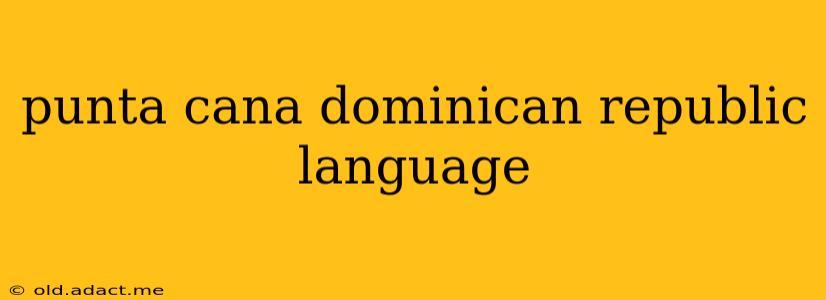Punta Cana, a vibrant tourist destination in the Dominican Republic, offers stunning beaches, luxurious resorts, and a rich cultural experience. However, navigating this beautiful location requires understanding the local language. While English is widely spoken in tourist areas, knowing some basic Spanish will significantly enhance your trip. This guide will explore the languages spoken in Punta Cana and provide helpful tips for communication.
What Language is Spoken in Punta Cana?
The official language of the Dominican Republic, and therefore Punta Cana, is Spanish. However, due to its popularity as a tourist destination, many individuals working in the hospitality industry, including hotel staff, tour guides, and shopkeepers, are fluent in English. You'll find that English proficiency varies depending on the location and the individual. While you might get by with English in many tourist-centric areas, learning a few basic Spanish phrases will go a long way in showing respect for the local culture and facilitating smoother communication.
What are the most common dialects?
The Dominican Republic has its own unique dialect of Spanish, often described as having a distinctive rhythm and pronunciation. While it's still mutually intelligible with other Spanish dialects, there might be some words or phrases that are specific to the Dominican Republic. You might notice a faster pace of speech compared to other Spanish-speaking countries. However, don't let this deter you. Most people will be happy to assist you.
Do people in Punta Cana speak English?
As previously mentioned, English is frequently spoken, especially in tourist zones. However, it's not universally spoken, so relying solely on English may present challenges outside of hotels and resorts. Many locals, particularly those outside of the immediate tourist areas, may have limited English proficiency.
How important is it to learn some basic Spanish for a trip to Punta Cana?
While you can certainly survive a trip to Punta Cana speaking only English, learning even a few basic Spanish phrases will greatly enrich your experience. It will allow you to:
- Connect with locals: Learning basic greetings and pleasantries demonstrates respect and can lead to more authentic interactions.
- Negotiate prices: Knowing how to ask about prices can be helpful, especially when shopping at local markets.
- Order food: Being able to order food in Spanish will expand your dining options beyond tourist-centric restaurants.
- Ask for directions: This will be invaluable if you venture outside of the resort area.
- Increase your safety and security: Knowing basic phrases for help or emergencies can be crucial in unexpected situations.
What are some essential Spanish phrases for Punta Cana?
Here are a few essential Spanish phrases to get you started:
- Hola: Hello
- Buenos días: Good morning
- Buenas tardes: Good afternoon/good evening
- Buenas noches: Good night
- Gracias: Thank you
- Por favor: Please
- De nada: You're welcome
- Sí: Yes
- No: No
- ¿Habla inglés?: Do you speak English?
- ¿Cuánto cuesta?: How much does it cost?
- Perdón: Excuse me/Sorry
- Ayuda: Help
Learning even these basic phrases will demonstrate your effort and willingness to engage with the local culture, making your Punta Cana experience more rewarding and memorable. While English will often suffice in tourist zones, embracing the local language will definitely enhance your trip.
